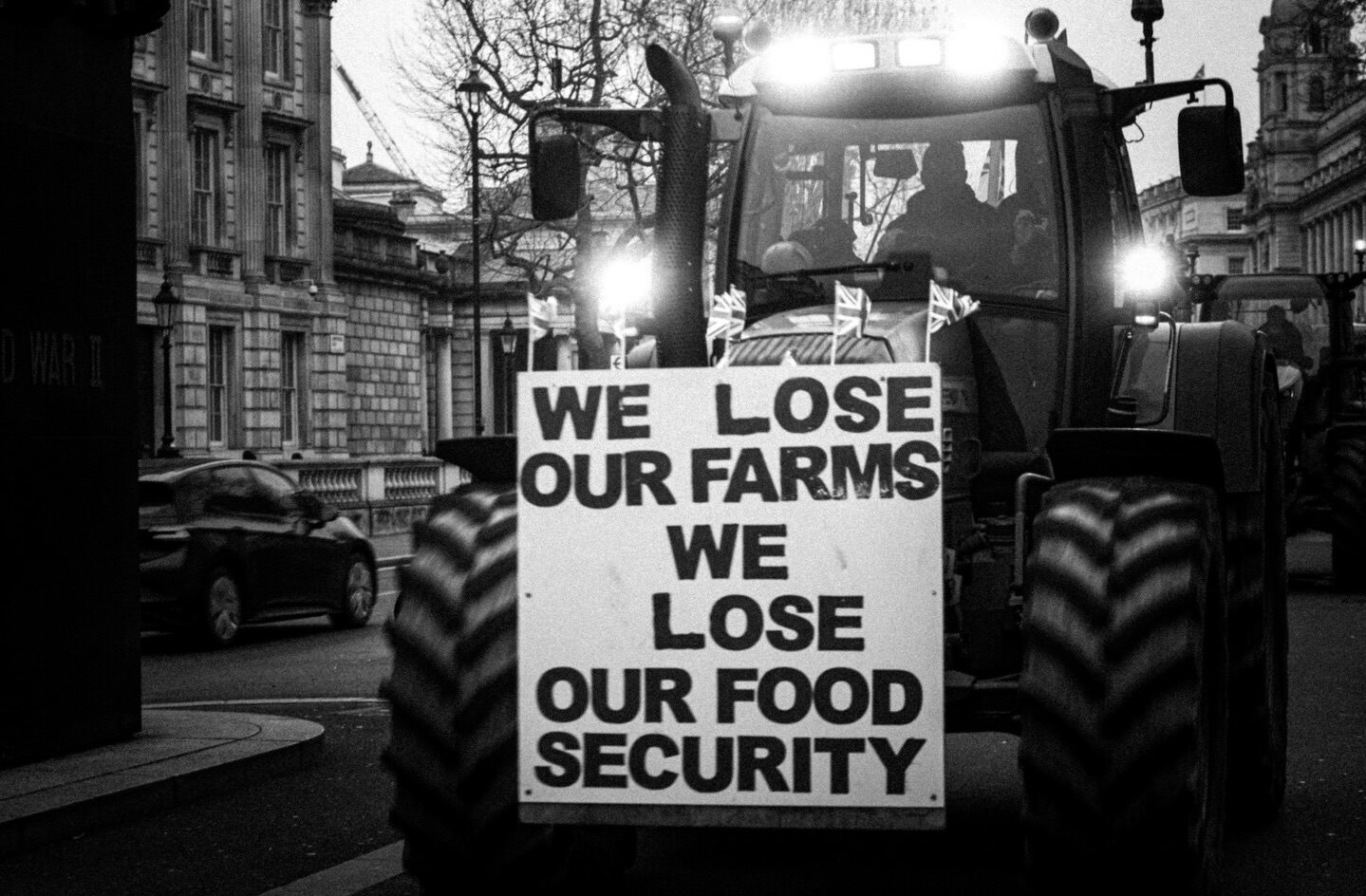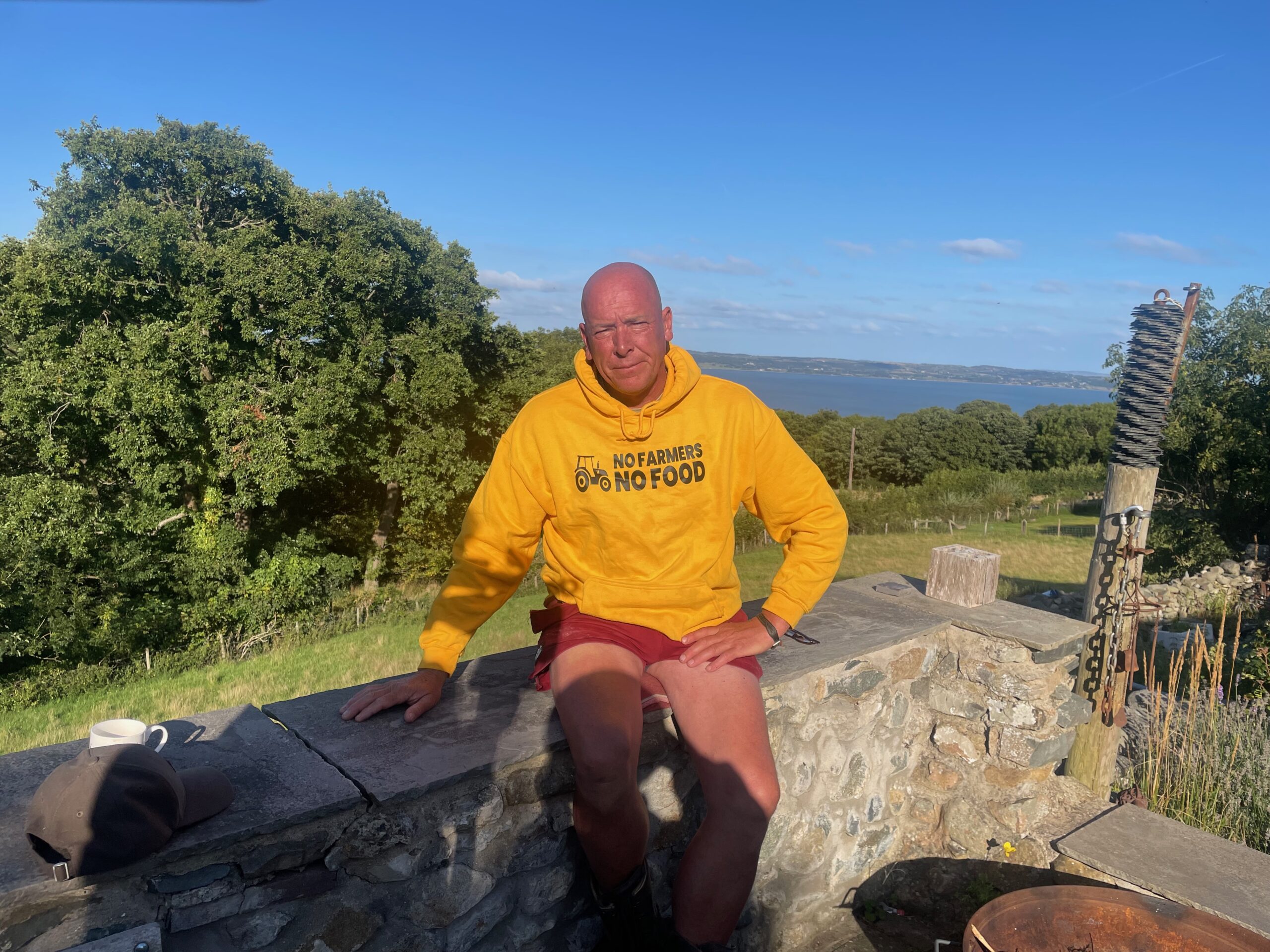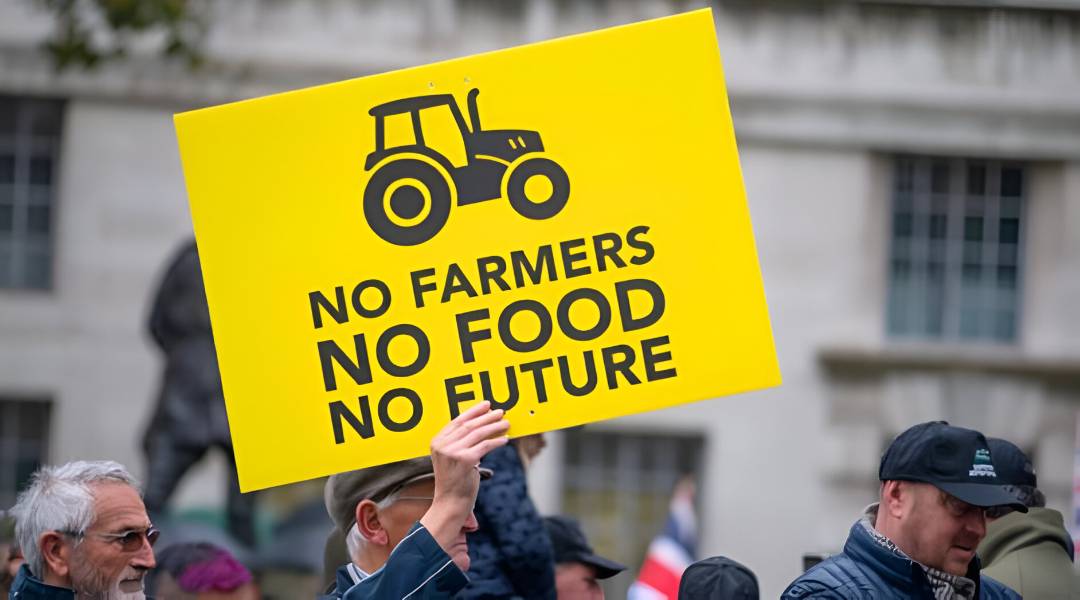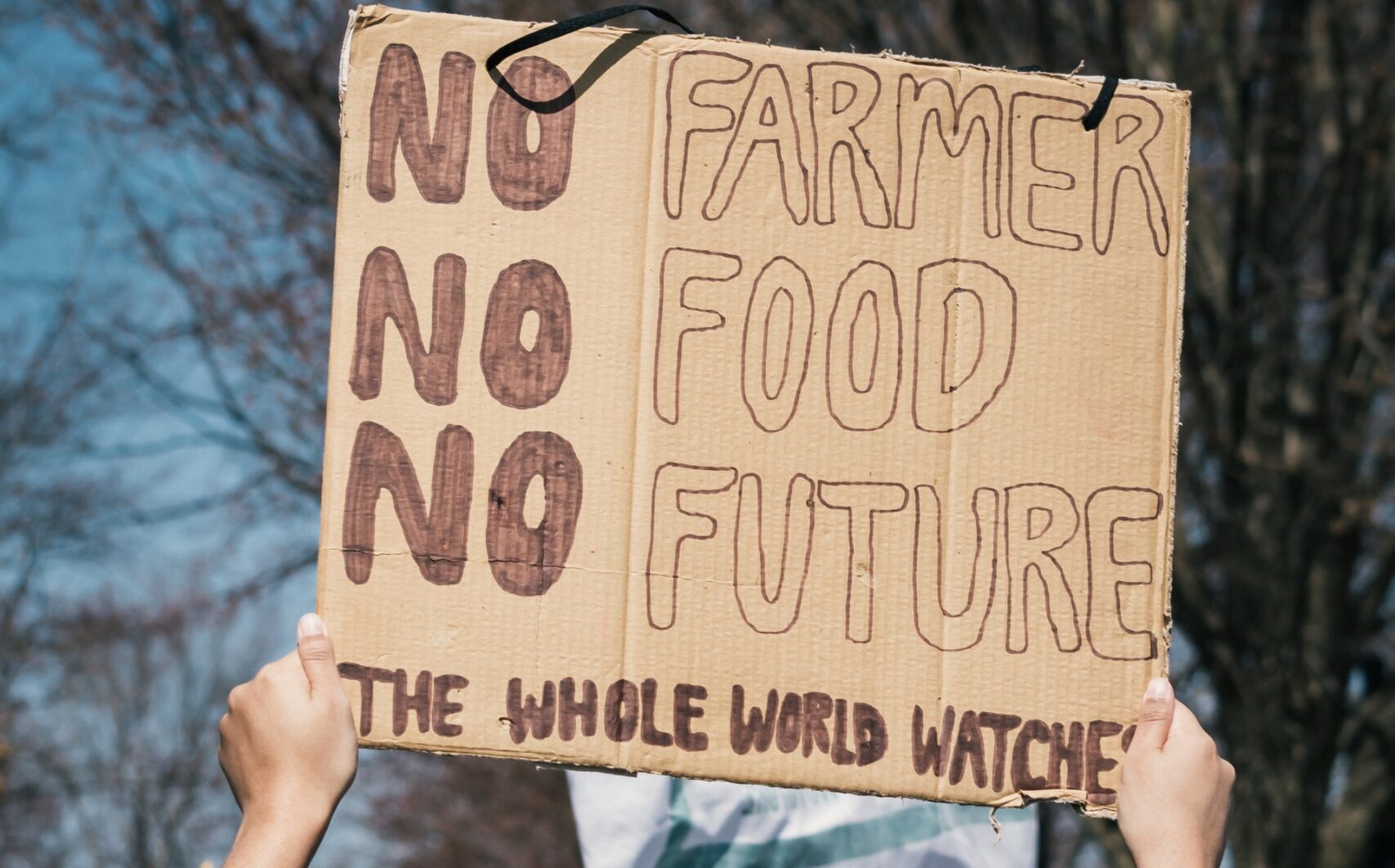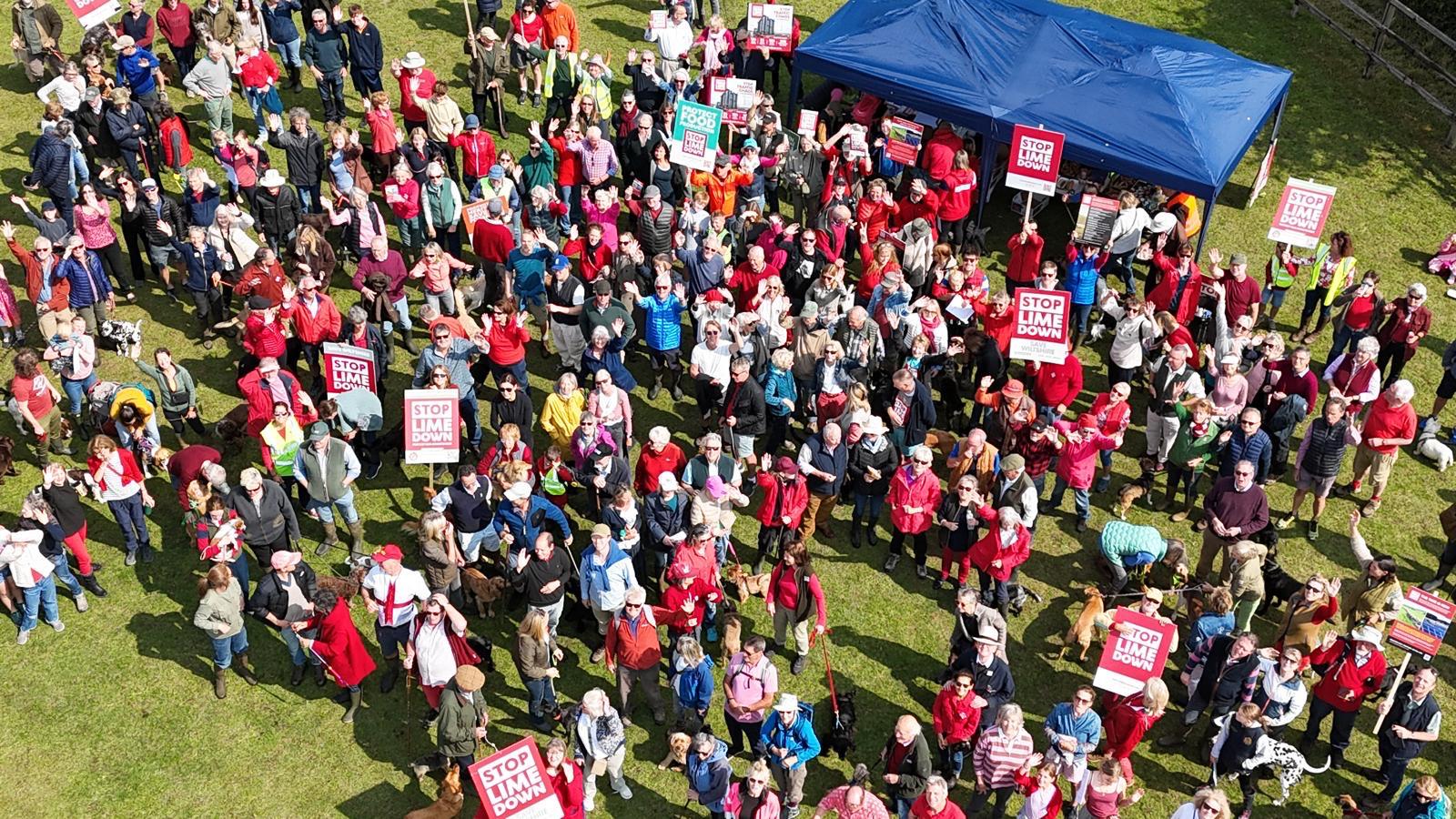Rooting for Real Farms: The Curly Pigs, Fermanagh
Stephen from The Curly Pigs in County Fermanagh, N. Ireland keeps rare breed Mangalitsa pigs that are slow grown and don’t need any antibiotics. They are rotationally moved around a native forest where they root around foraging for food, digging up invasive plant species and regenerating the forest floor. Stephen says, “The fat stores any chemicals that are put into the animal’s body so it’s a necessity for us to go medicine free. They don’t get antibiotics, they don’t get iron boosters, it’s all a myth. Providing you give them the proper environment they don’t need the extra chemicals.”
Please support our small scale, high welfare farmers by giving this video a like and a share.
Corporate power and influence silences dissent
Although promoters of the industrialised global farming system swear blindly that it is the only way to feed the world, 1 billion people are starving or malnourished while 2 billion are overweight or obese due to the unhealthy, inefficient and wasteful food system that industrial agriculture perpetuates. Why then is Bill Gates championing industrial agriculture in Africa? Could I suggest it is because the success of his corporate and digital mindset has inflated his ego to believing the myth that the only way to feed the world is through the GM, machines and chemicals made by his elite corporate colleagues. By setting himself up as a ‘philanthro-capitalist’, his PR machine portrays him as a generous hero funding industrial agriculture, while he conveniently expands his wealth through his investments in those same corporations. He is out of touch with the truth as his elitism has rendered him deaf to the hundreds of millions of farmers and consumers in Africa and India who are demanding that this maverick billionaire stops bribing their governments to allow the corporate takeover and destruction of their land, livelihoods and local food systems.
‘Africans have long been told that [their] agriculture is backward and should be abandoned for a 21st-century version of the Green Revolution… Western science and technology, in the form of seeds modified by science and technology, synthetic fertilizers and pesticides, petroleum-fueled machinery and artificial irrigation were key to that miracle, we are informed, and we too need to tread that path’.
A primary proponent of this view is the Cornell Alliance for Science (CAS), founded in 2014 to “depolarize the charged debate” around genetically modified (GM) seeds. With $22 million in funding thus far from the Bill and Melinda Gates Foundation, the CAS in fact consistently defends GM seeds, arguing that they are healthy, productive and environmentally friendly, while attacking agroecology as economically and socially regressive.
In contrast, the Alliance for Food Sovereignty in Africa (AFSA), which represents more than 200 million farmers, fishers, pastoralists, indigenous peoples, women, consumers and others across all but five African countries, holds that agroecology is what our continent needs. Small-scale, eco-friendly cultivation methods using indigenous knowledge and inputs and cutting-edge science increase the variety, nutritive value and quantity of foods produced on farms while stabilizing rural economies, promoting gender equity and protecting biodiversity.’
Banned pesticides on the menu?
No one is safe from the corporate hegemony of the global food system. In the so-called ‘developed’ countries, citizens have fought long and hard for regulations to help stem the destruction of ecosystems caused by industrial agriculture. However, their neoliberal politicians are in the process of opening markets to substandard imports that perpetuate a race to the bottom. A new report from Sustain and PAN UK, warns that the UK could be opening the door to 119 pesticides, banned for health and environmental reasons, as a result of signing up to the Pacific free trade agreement (TPP). The deal, with 11 countries, including Australia, Canada and Mexico, risks exposing UK consumers and wildlife to a new suite of toxic pesticides.
‘For UK farmers, the report highlights that the deal could spell disaster. It risks cheap food imports produced to weaker pesticide standards flooding the domestic market, undermining UK farmers’ competitiveness. And if the UK weakens its pesticides regime due to joining the CPTPP, farmers will lose their largest export market as UK produce will no longer meet EU standards.’
Gene edited pigs on the menu
It is extraordinarily arrogant of our UK politicians to think that they can dig themselves out of the destruction of our planet with the type of ‘science’ that has been researched and patented by a few giant corporations to serve their profits and power. As Henry Kissinger, the American war hawk and ‘political scientist’ said in 1970, “Control oil and you control nations; control food and you control people”. The EU’s Precautionary Principle ensures that gene editing is subject to the same rules as the production of genetically-modified organisms (GMOs) and both technologies are subject to sufficient scrutiny to largely prevent their use within the EU. However, the Tories believe that they can treat the symptoms of a broken agriculture and food system, by deregulating this much contested science.
Gene-edited pigs are to be reared to fight a respiratory disease caused by their incarceration in intensive factory farms where they inhale ammonia and other toxins from their biodegrading faeces. It is not a genetic disease, rather one that is exacerbated by pigs’ cruel environment, thus we should change their lived environment, not their genes. By creating disease-resistant animals farmers will be discouraged from improving the welfare of their livestock.
Helen Browning, President of the Soil Association, has kept pigs for 30 years on her organic farm in north Wiltshire. Ms Browning says;
“If gene editing is being used for disease resistance and it is not encouraging companies to change the way they keep their pigs so they don’t get disease in the first place, then it (gene editing) becomes a problem rather than a solution”.
Empty promises
The UK is struggling to save its fragile ecosystem from the ravages of industrial agriculture, fast track planning policies and government inaction to protect our farmers from cheap substandard imports. However, Philip Dunne MP, Chair of the Environmental Audit Committee, abstained from voting for amendments in the Agriculture Bill that sought protection from substandard imports. As explained 9 mins into Farming today, he thinks that the lack of direction in the government’s 25 Year Environment Plan to leave the countryside in a better state for the next generation, can be cured with the appropriate expertise along with the milestones and detailed targets to stop biodiversity decline.
“We’ve identified lots of areas where there’s been a significant reduction in ecologists across public bodies particularly in local authorities. If we are going to get a net planning gain, which is the government’s ambition and we are going to legislate for that, we have to have ecologists in place across the planning authorities and the same goes for Natural England and the environment agency who both have roles to play. They need to ensure that they have the right expertees, to be able to help land managers to achieve the kinds of changes in practice that are necessary to hold this decline in nature”.
Silencing protest
In a world where corporate lobbies are extremely powerful, politicians need NGOs and individuals to be vocal and active to garner the media attention that enables them to challenge the corporate lobbies and press for laws to protect citizens’ wellbeing. So the rights to protest and trespass are vital in a democracy. Why then did Philip Dunne vote for the Police, Crime and Sentencing Bill that passed this week via Tory majority; 365 MPs backing it and 265 opposing. Protests can now be stopped if deemed too noisy, at seemingly arbitrary volumes, while police senior officers have now publicly stated that they did not request the power to stop noisy protests, undermining the home office’s bill even further. That includes protests consisting of one person. It is now a criminal offence (previously it was only a civil offence) to trespass on to an animal factory even if to expose illegal cruelty. The bill also proposes restricting any activities around Parliament to a “controlled area”.
‘The Shadow Home Secretary criticised the proposed law, which touches on huge swathes of the justice system, as one that “does more to protect statues than it does to protect women”, telling MPs that the bill showed a “warped sense of priorities”…“It’s a bill that destroys the fine British tradition of protecting the right to protest. A bill that allows the noise generated by persons taking part as a reason to curtail protest,” he said. “Our laws on protest have always been a balance and the way this proposed law disturbs it is wrong.”
The legislation contains provisions that would grant the police powers to curb any protest that would “result in serious disruption to the activities of an organisation” or have a “relevant impact on persons in the vicinity”.
Solutions
Throughout the lockdowns we posted videos made by high welfare pig farmers who all found enthusiastic new customers because of the increasing popularity of locally produced food. According to Sustain’s Report, Good Food Enterprises: Adapting to the pandemic one year on, farms like these are sustaining high support post pandemic.
‘We define ‘good food enterprises’ as those that use farmer focussed supply chains, prioritise healthy and sustainable food, and increase access to, and the affordability of, good food. Good food enterprises may be non-profit, social enterprises or for profit food retailers and play a part in their community beyond trading.
In May 2020, we surveyed good food enterprises in our network to understand how they were being affected by the lockdown restrictions and found that, on large, good food enterprises were resilient and able to respond to changes in need and supply shortages. One year on, we followed up to understand the longer term impacts’.
News round-up
? Listen to farming today on the 5th of July (3 minutes in) where they discuss that it is vital that we follow the EU in banning cages for animals. Despite pig farmers claiming that farrowing crates prevent piglets from being crushed when the modern hybrid overweight sow lies down, Olga Kikou, head of European branch of Compassion in World Farming points out that;
“Cages are not good for animal welfare regardless of the species… and updated research shows there are fewer incidents of piglet crushing in free-farrowing systems. A cage is really bad for the welfare of the sow… We have alternative systems that are used by farmers across Europe that provide alternatives… We have called for a prohibition of imports from outside the EU from countries where cages are still used [to ensure fair trading for EU farmers]”
? Watch this new film about local community gardens and food resilience!
? The UK’s organic pig herd has reduced and has become the smallest in over a decade
‘The organic pig herd totalled 27,000 head, the lowest number in at least a decade and 20% lower than the year before.’
⁉️ How can we trust the BBC to do unbiased reporting if they are telling our children that climate change has ‘benefits’ via BBC Bitesize, its website for school children?
‘The BBC has faced massive backlash because BBC Bitesize, its website for school children, claimed warmer temperatures “could lead to healthier outdoor lifestyles” and that a benefit of climate change could mean easier access to oil in Alaska and Siberia.’
? We need clear, honest, good reporting that exposes truths to the public. The truth behind oil and gas pollution and devastation was hidden for decades, and companies ignored climate research and red flags;
‘Back in 1980, there was a guy working for Exxon and he was one of the inventors of the lithium battery, which electric cars now use. This guy won the Nobel prize in chemistry for his work on lithium batteries. Just imagine if Exxon management had taken our prediction seriously! They could have easily built huge factories to make lithium batteries to facilitate the transition to electric cars. Instead, they fired this guy. They shut down all their energy work. And they started funding climate deniers.’
? Check out this infographic showing the links between trade and climate change. It shows how trade can play a role in helping the UK reach its climate targets, but only if it rethinks its approach to trade.
‘Tackling the climate and environmental crises is more urgent than ever and global momentum to do so is building rapidly. Yet international trade law lags behind and threatens to choke off serious action. The need to reshape trade policy is urgent.’
? Pigs flock to the Spanish sun, exports to China means Spanish pig farms are growing in size and number.
‘A real boost for the Spanish pig sector was the construction of a mega slaughterhouse by the Italian meat company Pini. Under the name Litera meat, Pini opened a slaughterhouse in Binéfar in 2019 that has a capacity of processing 160,000 pigs every week. The complex is located on a 13ha site, has 22 cutting lines and employs 1,600 people. At 10 km from this complex, Pini opened a sow slaughterhouse.
⛔ Indigenous community calls for protective measures as pork industry grows;
‘Featuring vast landscapes of untouched jungle and one of the most extensive karst aquifer systems on the planet, the state of Yucatán is among the most biodiverse in the country. It is also a state where deforestation has claimed over one third of the jungle, mainly due to rapid agricultural development.The state has recently become an epicenter for growth for the pork industry, and intensive pig farms have begun to appear amid the jungle landscape in areas inhabited by indigenous beekeepers and small farmers. With plans to establish more farms in the region come questions about the local impacts of intensive pig farming in Mexico.’
Please donate
Forgive me for pointing out that, while we receive some one-off donations, I am funding Farms Not Factories myself, and if we are to continue to fight the cruel, antibiotic-led factory farm system, we will need some regular donations from like-minded people. Please consider a monthly subscription of £2/month and help us support a network of smaller scale, humane and healthy UK pig farms, local abattoirs and butchers.
“Our message is simple, we want to help bring an end to this dangerous, inhumane system. Vote for real farming over factory farming.”
– Tracy Worcester, Director
Contents
Share This Article
Related ArticlesView All
Protect UK Farmers from Low Standard Imports
The purpose of our newsletter is to give you important information that is censored in the mainstream media. “The way… Read More
Protectionism vs So-Called Free Trade
The purpose of our newsletter is to give you important information that is censored in the mainstream media. “The way… Read More
Find A Farmer
The purpose of our newsletter is to give you important information that is censored in the mainstream media. “The way… Read More
Zionist Money Rules
The purpose of our newsletter is to give you important information that is censored in the mainstream media. “The way… Read More
The Price of Progress
The purpose of my newsletter is to give you important information that is censored in the mainstream media. “The way… Read More
Silencing Dissent Through Fear
The purpose of my newsletter is to give you important information that is censored in the mainstream media. If you… Read More

